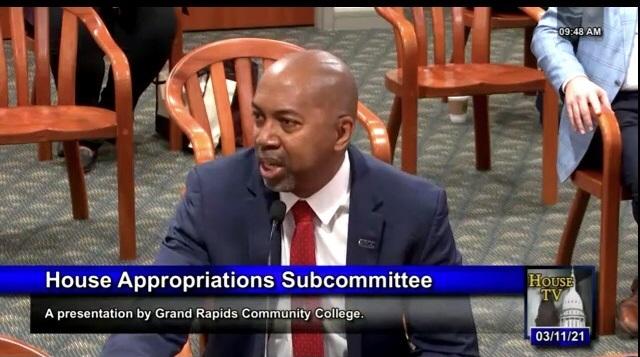March 11, 2021 LANSING, Mich. – The pandemic changed the way Grand Rapids Community College offered classes and support services – and many of the changes are likely to remain to help students overcome obstacles, Grand Rapids Community College President Bill Pink told lawmakers Thursday.
Pink was one of four college presidents to testify before the state House of Representatives Appropriations Subcommittee on Higher Education and Community Colleges. The subcommittee is chaired by state Rep. Mark Huizenga, and includes state Reps. Tommy Brann and Bradley Slagh from West Michigan.
Lawmakers preparing the 2021-2022 state budget wanted to know how COVID-19 forced colleges to make changes and what their roles might be in the state’s recovery.
“Our community colleges are the answer to helping get our communities back up and running, back up to work, get our companies back up to speed,” Pink said.
He said community colleges provide students with a pathway to earn credits for degrees or to transfer to a four-year institution, but also partner with employers to adapt to the changing needs of the workplace and provide students with in-demand career skills.
“I believe in the work we do,” he said. “That’s the value and the power of the community college. And that is why I believe our institution, along with the 27 others community colleges in the state, will be a vital part in getting our state back up and running."
After initially transitioning all classes remotely, GRCC adopted four educational formats, with online, hybrid, virtual real-time and in person classes. About 80 percent of fall 2020 classes had online components.
While the percentage is planned to change this fall, with a significant increase in in-person instruction, the online offerings proved to provide increased accessibility.
“One thing this pandemic has done is that it has taught us several lessons,” he said. “The thing about being taught lessons in a crisis is that you make all your adjustments and then you look at what worked and what you need to keep. I like to look at what our normal will look like going forward. We won’t look the same as we did before.”
While many students indicated they prefer in-person classes, Pink said the virtual offerings helped students schedule around home and work responsibilities.
The college also became aware of the size of the technology gap.
GRCC purchased more than 500 laptops and about 350 mobile Wi-Fi hotspots to loan students, and strengthened the Wi-Fi signal in a campus parking lot. The college also partnered with the Kent Public Library to provide students with Wi-Fi access in branch parking lots, and created a Wi-Fi zone in the new Lakeshore Campus under construction in Holland Township.
Pink told lawmakers the college worked with community partners to provide students and their families with more than 2,400 packages of groceries from the campus food pantry since March 2020. Donations also included hygiene products, cleaning supplies, baby supplies and pet food.
Organizations providing food or resources include Heart of West Michigan United Way; Kent County, Michigan government; GRCC Student Alliance; GRCC Campus Dining; the Secchia Institute for Culinary Education; Feeding America West Michigan; Plainsong Farm; the Grand Rapids Children's Museum; I Support the Girls; and others.
Pink also thanked senators for their support for the Futures for Frontliners program, which provides free community college tuition to people who served in essential roles during the spring shutdown, and Michigan Reconnect, which covers tuition for students 25 and older who don’t have a degree.
Pink was joined in Lansing by Saginaw Valley State University President Donald Bachand and Washtenaw Community College President Rose Bellanca. Grand Valley State University President Philomena V. Mantella participated via Zoom.
Grand Rapids Community College offers learners of all ages opportunities to gain credits for degrees or transfer and in-demand career skills leading to rewarding careers. GRCC was established in 1914 – Michigan’s first community college – and offers affordable classes on weekdays, evenings, Saturdays and online at locations throughout Kent and Ottawa counties.
